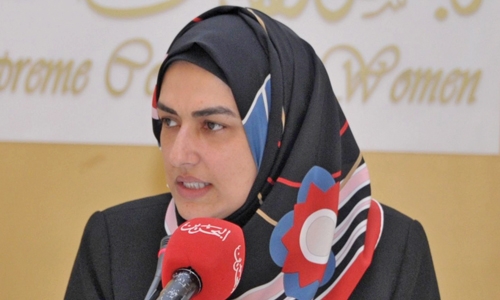Women engineers march ahead
Her Royal Highness Princess Sabeeka bint Ibrahim Al Khalifa, Wife of His Majesty the King and President of the Supreme Council for Women, is patronising the celebrations of Bahraini Women’s Day today, dedicating the occasion to the success of women in the field of engineering.
Bahrain has succeeded on the international level in empowering women and enabling them to be a cornerstone of progress and prosperity within the national movement.
Bahraini female engineers in the government sector constitute 35 per cent and in the private sector 23 per cent.
The Women’s Day celebrations being held under the patronage of Her Royal Highness will shed more light on the female engineers’ contributions and achievements to the overall growth of Bahrain.
“It is essential to develop engineering programmes and university courses to cater to increase more and more opportunities that lead to the overall progress of the nation,” said Secretary General of the Supreme Council for Women Her Excellency Hala Al Ansari.
“A major requirement is to address the issues that reduce female engineers’ progress in the different engineering specialisations they serve,” said Al Ansari.
Al Ansari said that even on the global level, Bahrain has proven its success in empowering women that led to making women’s participation and presence the cornerstone of building and development within the national movement.
The percentage of female Bahraini graduates from the total Bahraini graduates from the Faculty of Engineering at the University of Bahrain for the 2015-2016 academic year was 50 per cent.
The percentage of Bahraini female engineers in the government sector was 35 per cent, and the representation in the private sector 23 per cent, according to 2017 statistics.
“The most important challenges are the urgent need to develop engineering programmes and university courses to cover the new technical knowledge and skills in the world of engineering and manufacturing, and to activate the academic guidance which must be in turn linked to the needs of the labour market to provide female engineers value-added opportunities to serve the country better,” said Al Ansari
Al Ansari said that some of the challenges women in the engineering fields face range from dominant cultures and work systems that reduce the chances of women’s survival or advancement in the field of their work, which requires emphasizing the need to accommodate to address women’s needs to assure that the principle of equal opportunities is achieved.
“The world is turning towards the so-called Fourth Industrial Revolution and the basic requirements include technological readiness and rapid transformation towards modernization and innovation. This makes us wonder about the future role of women in the face of scientific and technical challenges focused on creativity, innovation and value-added activities that require high flexibility. This is an essential need to succeed in transforming one field to another, and to understand carefully the motivations of progress and growth within a global system that eliminates space and time constraints,” said Al Ansari. “This way we find a new incentive and ambition for women, in order to acquire promising engineering and technical skills and expertise in a structured strategic framework, develop their competitiveness and increase their contributions to national development,” Al Ansari said.
Al Ansari said that authorities and institutions concerned can continue to develop the policies and plans through which we work to fill any gaps affecting the integration of women in the labour market and public life.
Related Posts

